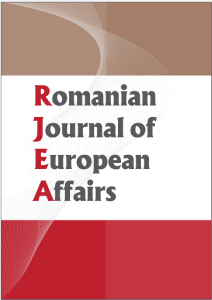Ediţia de iarnă a Romanian Journal of European Affairs analizează subiecte referitoare la: abilitatea UE de a dezvolta capacităţi pentru gestionarea civilă a crizelor, teoria (dez)integrării monetare politice, o evaluare conceptuală a Statelor Unite ale Europei, fundamentele culturale ale autocraţiei, o evaluare a eco-eficienţei economiei româneşti şi problematica romilor, ca minoritate protejată – politici şi bune practici în cadrul Uniunii Europene.
A Giant with Feet of Clay? The EU’s Ability to Develop Capabilities for Civilian Crisis Management
Rafal Domisiewicz
Abstract:
Civilian crisis management has long been considered the EU’s forte. Recent research however has questioned the EU’s claim to this specialization. I will interrogate how the EU has fared in building civilian capabilities for CSDP through a case study of the impact of the Europeanization of CCM norms in one of the newer EU member states – Poland. I investigate the domestic reverberations of an EU-level CCM governance – conceptualized as a vertical diffusion of norms – and a horizontal diffusion in the realms of policy setting, institutional adaptation, as well as in recruitment and training. I hypothesize that the European cognitive constructions and policy designs are the more likely to impact upon Polish security policy the more they resonate with the ideas embedded in the national security identity. Another intervening variable affecting the ‘translation’ of EU policy into the domestic context is state capacity. Due to weaknesses in the supply side of CCM and the refracting impact of national security identity and state capacity, I find that Europeanization has had a limited impact on the civilian response capability-building in Poland. Europeanization has been shallow, featuring adjustments on the margins rather than the core of the security policy.
Keywords: capability-building, civilian crisis management (CCM), Common Security and Defence Policy (CSDP), Europeanization, Polish security/defence policy, security governance
The Theory of Political Monetary (Dis)Integration; A Minority Report from the Perspective of Austrian Economics
Radu Cristian Mușetescu, Octavian-Dragomir Jora
Abstract:
The issue of monetary disintegration gains an increasing place in the interest of political economists and policy makers alike. Until recently, the process through which two states that previously shared a common currency decide to abandon it and choose national currencies instead was a marginal and accidental event in history. It was met in the case of political disintegration of state constructions such as Czechoslovakia, Soviet Union or Yugoslavia, typically built through military aggression and experiencing widespread economic planning. Today, world may experience another type of monetary disintegration. In this case, it is the result of a deep economic crisis affecting the democratic process of integration in Western Europe. The difficulties experienced by some of the member states of the Euro-zone as well as the debate around the correct path towards solving them has raised the scenario that at least some of these countries will abandon their membership of the European Monetary System. The hallmark characteristic of these states is their open and predominantly market-oriented economies. Their return to a planned economy as well as complete autarchy from the rest of the global and regional economy is highly improbable. But they have also a monetary system based on political money and massive wealth redistribution is possible through the monetary mechanism.
Keywords: European Union, integration, monetary competition, money
The United States of Europe: A Conceptual Assessment
Florin Bonciu
Abstract:
The paper aims to analyze the concept of United States of Europe from the point of view of previous historical attempts to unite the European state entities as well as from the point of view of a comparative analysis with the United States of America. In order to establish a very clear framework of analysis from the very beginning some possible errors of reasoning are presented. As result of the analysis, the conclusion is that a true European federation of states is very unlikely to materialize in the foreseeable future while some elements of a federal construction are still possible. Another conclusion is that a partial federal construction is not effective; on the contrary, it is prone to generate disequilibria.
Keywords: European administration, European federation, European unification, United States of Europe
Cultural Foundations of Autocracy and Their Amendment: What Can Higher Education Institutions Do?
Iulian Oneașcă
Abstract:
The paper examines the foundations of the societies in Central Asia (CA) and their impact on politics, recalls similarities with Central and Eastern Europe (CEE), attempting to make recommendations for the societies’ advancement. Firstly, I analyse the connections between cultural heritage and politics, introducing two pillar concepts, the societies’ cultural and institutional foundations. They are discussed with a view to understanding and revealing the model of society ingrained in politics and materialised in CA societies. Then, I examine the social capital and the exercise of power, illustrate beneficial associations and trade-offs between culture(s) and politics. Shortages are exposed and opportunities and circumstances for conflicts revealed. I substantiate the contradictory impacts of the international arena; I tackle synergies and discuss means to combine influences between politics and cultures. Finally, I incorporate findings into policy terms. The rudiments of a working system to foster progress in CA are seen in developments of both individuals and their governance systems. Recommendations are made with regard to how Higher Education Institutions can dodge flawed cultural influences and amend autocracy. The issues of CA societies are addressed with a strong policy focus, making policy recommendations and aiming at rising debates.
Keywords: Central Asia, Change, Higher Education Institutions, Model of Society, Politics
A Threefold Assessment of the Romanian Economy’s Eco-efficiency
Viorel Niţă
Abstract:
The present paper assesses the ecological sustainability of the Romanian economy from three different angles. The first two applications use the economy’s energy and material consumption as proxy for its overall environmental impact. The third assessment approach is a qualitative and context-based one: the main obstacles to and opportunities for incorporating sustainability-competitiveness synergies into the Romanian industrial firms’ management are identified. In the period 2000-2007, GDP growth was an important contributor to the Romanian economy’s eco-efficiency levels, while the material and energy consumption remained constant or even increased. The predominance of competitive advantages based on low labour costs, high potential of increasing labour productivity, deficient environmental and industrial policies, and lack of awareness in both business and policy environment as to the beneficial role of resource productivity increase constitute significant obstacles to adopting competitive sustainability strategies. Fortunately, the relatively low levels of eco-efficiency and eco-innovation in industry offer in fact a wide scope of still unexploited win-win solutions. On the basis of the results, further research directions are sketched and several desirable public policy actions for enhancing the ecological sustainability of the Romanian economy are put forward.
Keywords: competitiveness., eco-efficiency, energy efficiency, material flow analysis, sustainability
The Roma as a Protected Minority? Policies and Best Practices in the EU
Sigrid Lipott
Abstract:
The Roma people are one of the most heterogeneous minority groups in Europe, encompassing a broad variety of cultural traits and linguistic diversity, resulting in numerous sub-groups and fragmented identities. However, the group defines itself as a ‘unified non- territorial transnational nation’. The most recent developments at European level show an increasing willingness to adopt minority rights documents directed to autochthonous minorities. This has provided also the Roma, or part of them, with opportunities to be granted effective protection with support in the rights-based approach. The following paper will focus on the issue of Roma minority protection in the EU. The first two sections introduce the key features present in the debate regarding Roma minorities, highlighting the in-group diversity. The third one analyses the different legal status of the Roma communities in the EU. The fourth section highlights the importance of a framework instrument for the protection of territorial minorities at a macro-regional level. The fifth part gives an overview on the European Roma policy and the sixth section looks at best practices in Europe as far as protection of Roma is concerned: lessons can be learned, in this respect, from Slovenia and Sweden. The level of protection will be analysed at both theoretical and empirical level, through the help of the results of a small scale research carried out among minority members.
Keywords: EU, minority, policies, protection, Roma






